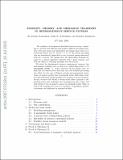Stability, Memory, and Messaging Trade-Offs in Heterogeneous Service Systems
Author(s)
Gamarnik, David; Tsitsiklis, John N; Zubeldia, Martin
DownloadSubmitted version (233.4Kb)
Open Access Policy
Open Access Policy
Creative Commons Attribution-Noncommercial-Share Alike
Terms of use
Metadata
Show full item recordAbstract
<jats:p> We consider a heterogeneous distributed service system consisting of n servers with unknown and possibly different processing rates. Jobs with unit mean arrive as a renewal process of rate proportional to n and are immediately dispatched to one of several queues associated with the servers. We assume that the dispatching decisions are made by a central dispatcher with the ability to exchange messages with the servers and endowed with a finite memory used to store information from one decision epoch to the next, about the current state of the queues and about the service rates of the servers. We study the fundamental resource requirements (memory bits and message exchange rate) in order for a dispatching policy to be always stable. First, we present a policy that is always stable while using a positive (but arbitrarily small) message rate and [Formula: see text] bits of memory. Second, we show that within a certain broad class of policies, a dispatching policy that exchanges [Formula: see text] messages per unit of time, and with [Formula: see text] bits of memory, cannot be always stable. </jats:p>
Date issued
2021Department
Sloan School of Management; Massachusetts Institute of Technology. Institute for Data, Systems, and Society; Massachusetts Institute of Technology. Department of Electrical Engineering and Computer Science; Massachusetts Institute of Technology. Laboratory for Information and Decision SystemsJournal
Mathematics of Operations Research
Publisher
Institute for Operations Research and the Management Sciences (INFORMS)
Citation
Gamarnik, David, Tsitsiklis, John N and Zubeldia, Martin. 2021. "Stability, Memory, and Messaging Trade-Offs in Heterogeneous Service Systems." Mathematics of Operations Research.
Version: Original manuscript